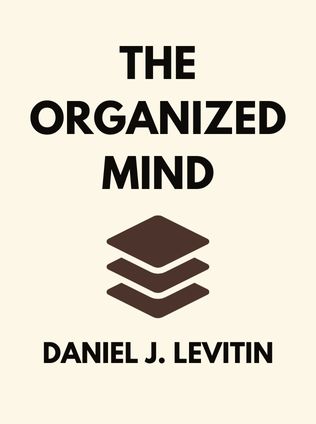
The Organized Mind
Thinking Straight in the Age of Information Overload
By Daniel J. Levitin
Published 08/2014
About the Author
Daniel J. Levitin is a celebrated neuroscientist, cognitive psychologist, and best-selling author who has captivated readers with his ability to translate complex scientific concepts into engaging, accessible narratives. Levitin’s diverse background in both science and music sets him apart as a unique voice in the realm of popular science writing. His first major work, "This Is Your Brain on Music," explored the intricate relationship between music and the human brain, earning him a spot on several best-seller lists for over a year.
Levitin’s academic credentials are equally impressive. He holds professorships at McGill University, where he heads the Laboratory for Music, Cognition, and Expertise, and at UC Berkeley. His research primarily focuses on the brain’s mechanisms for attention, memory, and decision-making, areas he explores in depth in his later works. With "The Organized Mind," Levitin brings his expertise to bear on one of the most pressing issues of our time: how to manage the overwhelming flow of information in the digital age.
Main Idea
"The Organized Mind" is a deep dive into the challenges posed by the modern world’s information overload and offers a neuroscientifically grounded approach to overcoming these challenges. Levitin posits that the human brain, while incredibly powerful, is not naturally equipped to handle the constant influx of data, decisions, and distractions that characterize contemporary life. Instead of trying to manage everything internally, Levitin advocates for the externalization of thoughts and the systematic organization of both our mental and physical environments.
The core thesis of the book is that by sorting and categorizing information, and by externalizing it—whether through writing, digital tools, or physical organization—we can significantly reduce cognitive load. This not only improves decision-making but also enhances creativity, reduces stress, and contributes to overall mental well-being. Levitin’s insights are supported by extensive research in neuroscience, providing both a theoretical framework and practical strategies for implementing these ideas in everyday life.
Table of Contents
- Introduction: The Age of Information Overload
- The Biology of Attention and Memory
- Why Multitasking Doesn’t Work
- Sorting and Externalizing Information
- Organizing Your Physical Environment
- Managing Digital Information
- Enhancing Creativity through Organization
- Making Better Decisions
- Organizing Relationships
- Conclusion: A New Way of Thinking
The Age of Information Overload
Levitin opens the book by addressing the sheer volume of information that we encounter in our daily lives. He notes that the modern world presents us with an unprecedented amount of data, from news headlines and social media updates to the constant demands of work and personal life. This bombardment of information is far more than our brains are evolved to handle, leading to what Levitin describes as "cognitive overload."
The problem, Levitin explains, is that our brains have a limited capacity for processing information at any given time. The constant influx of new data requires us to make decisions—whether to engage with or ignore this information—and this decision-making process is mentally exhausting. The brain does not distinguish between significant and trivial decisions, expending the same amount of energy on each, which can lead to decision fatigue and reduced cognitive function over time.
Levitin cites globalization and rapid technological advancement as key contributors to this overload. With news and information now available from around the world at the touch of a button, we are exposed to far more stimuli than previous generations. Moreover, technology has introduced new demands on our attention, from the need to learn new software and devices to the pressures of maintaining an online presence.
- The constant stream of notifications on our smartphones, each requiring a decision on whether to respond, contributes to cognitive fatigue.
- Social media platforms, which constantly update with new content, create a never-ending source of distraction.
- Work environments that demand multitasking and rapid shifts between tasks exacerbate the sense of overwhelm.
Levitin argues that this overload not only affects our decision-making but also impacts our emotional well-being, leading to increased stress and anxiety. The solution, he suggests, lies in recognizing the limits of our cognitive capacities and finding ways to manage the flow of information more effectively.
The Biology of Attention and Memory
In exploring how our brains handle attention and memory, Levitin draws on his extensive background in neuroscience. He explains that attention is a finite resource, governed by two primary modes: the Central Executive (CE) mode and the Mind-Wandering (MW) mode. The CE mode is what we engage when we are focused on a specific task, while the MW mode is the brain’s default state when it is not actively engaged in a task.
Sign up for FREE and get access to 1,400+ books summaries.
You May Also Like
The Subtle Art of Not Giving a F*ck
A Counterintuitive Approach to Living a Good Life
By Mark MansonRich Dad Poor Dad
What the Rich Teach Their Kids About Money - That the Poor and Middle Class Do Not!
By Robert T. KiyosakiHow To Win Friends and Influence People
The All-Time Classic Manual Of People Skills
By Dale CarnegieFreakonomics
A Rogue Economist Explores the Hidden Side of Everything
By Steven D. Levitt and Stephen J. Dubner



















